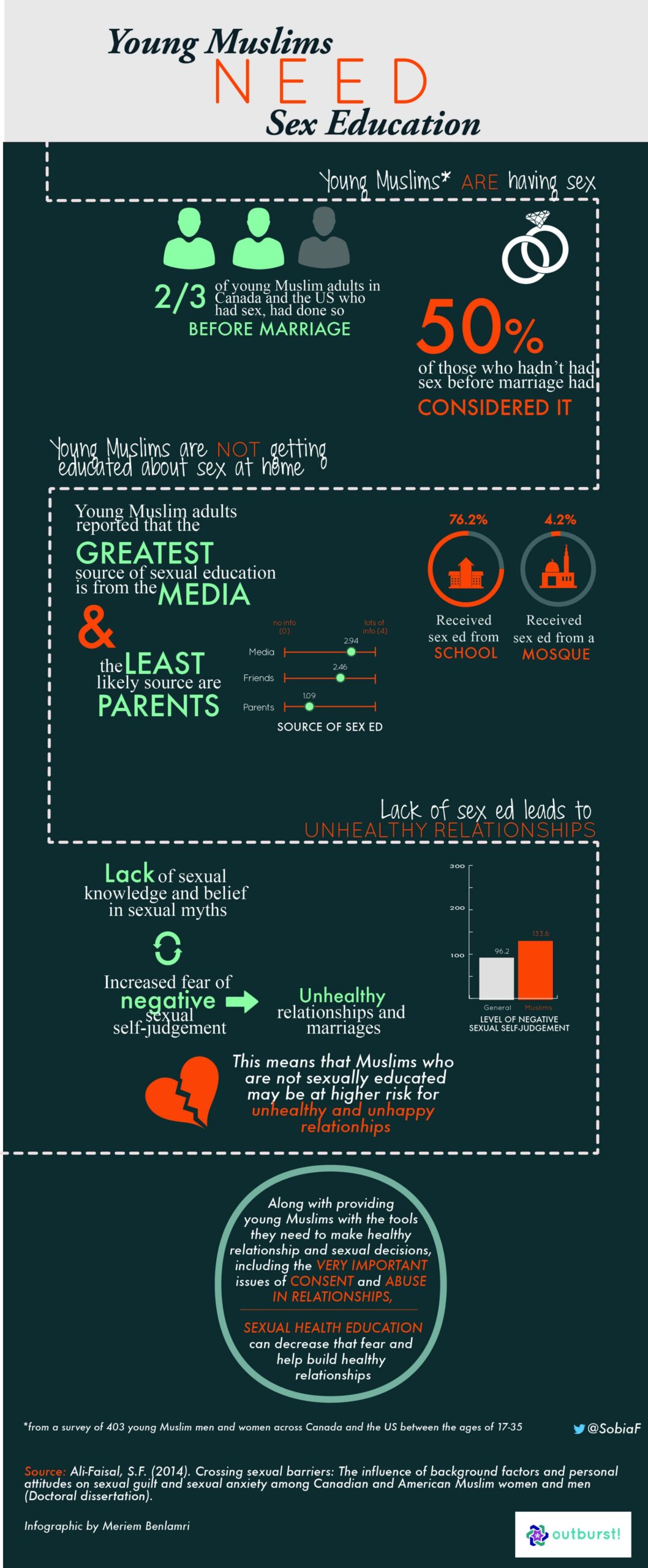
by Sameera Qureshi
“Well, how do you know if you and your future spouse are sexually compatible if you don’t have sex before marriage? What if he’s a dud in bed?”
I did a double take at the text message, let out a sigh of exasperation, and tucked my phone away.
Abstinence. Islam, and many other faith traditions, preach “no-sex-before-marriage” as the ideal. Yet the reality is that the majority of non-married individuals will engage in pre-marital sex. The statistics related to Muslim communities are no different: research by Sobia Ali-Faisal indicated that of over 400 17-35 year old Muslims surveyed, 2/3 had engaged in pre-marital sex. And of the 1/3 who didn’t, 50% had seriously considered it.
At this point, I’d like to clarify that this post is not about the fiqh (i.e. religious law) related to pre-marital sex. I’m sure at one point or another as Muslims that we have either received the “sex is haraam (impermissible)” line during our 5-minute pre-puberty sex talk, and/or our parents made us close our eyes during kissing scenes on TV, and this was enough to shame us into not asking anything about intimacy and sex.
Hopefully, reading through this post won’t be that embarrassing.
Most articles and blog entries written about abstinence focus on telling Muslims what we already know: that sex before marriage (i.e. zina in Arabic) is haraam (i.e. religiously impermissible). I am not here to regurgitate this or to convince you of this fact. Rather, my goal is to dissect this notion of abstinence into its myriad of layers that we tend to overly simplify, without much success, and then not talk about.
As Muslims, we are not born with the abstinence switch turned on (no pun intended). Too many of us wrongly believe that abstinence is automatically assumed among all followers of our faith tradition (followed by the fallacy of us therefore not needing information about sex until the night before the wedding). Yet we tend to forget that Muslims are diverse in nature, and like any other religious belief under the umbrella of Islam, abstinence is a choice.
Having worked with teen girls around the notion of values-based abstinence, I’ve come to realize how complicated making a decision around sexual intimacy can be, at any age. The girls that I’ve worked with have opened my eyes to what many struggle with: feeling strong emotions and desires for someone and wanting to express this through intimacy and sex; the difficulty with delaying gratification until an unknown point in the future; the pressures girls feel in relationships, because unfortunately, Muslim youth aren’t educated about healthy relationships before they start dating; the promise from their partner that “sex is OK because our intention is to get married, Inshallah (God willing).” I could go on and on about how complicated of a decision it is to choose to abstain from sex or to not. I would even argue that the decision to abstain is easier to make when you’re single and not in a relationship, and takes much more “willpower” to stick to when you’re getting to know someone and are obviously attracted to them physically, emotionally, and spiritually.
Which leads me to define what abstinence means. While the traditional definition focuses on sex, I’ve come to learn through my work and research that we all have different takes on abstinence that depends on a myriad of factors including values, sexual health education exposure, experiences, etc. We each tend to define abstinence differently in terms of what we’re “comfortable with” in a relationship. For example, some Muslims will say absolutely no touching of any sort (i.e. even a handshake) is permissible before marriage. Some Muslims are fine with public displays of affection but draw the line at anything in isolation from others. Some Muslims are fine with everything up to and including sex. Some Muslims may try different forms of physical intimacy with their partner and will change their definition of abstinence – which is absolutely healthy and brings to this discussion the notion of consent. Just because someone consents to sex with their partner (or any form of physical intimacy for that matter) one time does not mean that consent is automatically present for future intimacy. Sex without consent is rape. Abstinence is also not something set in stone – our definition of it can change over time and within the context of a relationship.
Working under the assumption that most Muslims are not abstinent from sex before marriage leaves me wondering how many are fully informed about safe sex? The work that needs to be done is around harm reduction:
- Do sexually active Muslims have the knowledge they need to keep themselves and their partners safe from STIs?
- Are they aware of contraceptive methods?
- Do both partners feel comfortable taking about their sexual experiences and boundaries, and do they gain consent?
- Are there elements of abuse or coercion in the relationship – emotionally, physically, spiritually and sexually?
- How often do they communicate with one another about their needs – sexual and otherwise?
- Do they know where to go for resources and support if they struggle with any form of intimacy? (i.e. trauma-related, vaginismus, etc)
I’ve heard many Muslims speak about the fact that by teaching the above information (which is essentially what comprehensive sexual health education is), people are essentially being led to experiment with sex. What many Muslims fail to realize is that research actually shows the opposite – that teaching values-based sexual health education that is comprehensive delays first time sexual activity and leads youth to make decisions about sex that are more in line with their values.
Go figure – knowledge leads to empowerment.
My decision to remain abstinent from sex before re-marriage has been met with a few dubious comments from people who know I’m divorced. And unfortunately, it’s mostly men who don’t seem to understand how personal of a decision abstinence is and it having nothing to do with being previously married. I’ve been trying to figure out how to describe my decision process for choosing abstinence, since again, no one talks about their decision either way. Because as much as we try to tell youth and young adults “just don’t do it,” this simplistic type of approach doesn’t work.
We cannot tell our youth to choose abstinence. They need to reach this conclusion on their own.
Shocking, I know.
While I haven’t created a model around “abstinence,” I do like to use a holistic approach in thinking about this concept. We tend to over-emphasize the physical aspect – “Don’t give into your sexual desires,” “It’s wrong to have sexual desires,” “Control your urges,” etc. Comments and thought processes such as these are not helpful. God created us with attraction and desires and we cannot shame people into abstinence. As a community, we have done this for years to Muslim girls and women, and the consequences are many.
Which leads me to bring up a very important point. Culturally speaking, I’ve seen many families and communities place all the pressure on girls and women to be abstinent while not endorsing (to say the least) the same for boys and men. From an Islamic perspective, the notion of abstinence applies equally to both sexes. Boys and men do not get a free pass – nor should they be permitted to expect abstinence from women when they themselves do not practice it. This dichotomy and double standard is dangerous and unfair. I do not for one second buy it when boys and men so confidently state, “Well, you know, I’m a man and I have needs” as a valid reason for their choice to be sexually active.
Because, so do women.
At the same time, we cannot endorse abstinence from a solely emotional/fear-based perspective – “You might regret having sex,” “What if you don’t get married?,” and “Sex is painful” is just a few of the erroneous and harmful statements that Muslims are often told. Statements such as these add to the emotional stress an individual is facing when it comes to deciding to be abstinent and/or following through with their decision. Not only that, but these false beliefs turn into shame that may follow individuals even into their marital life.
The path that people who choose to be abstinent take varies. My own decision-making around abstinence revolves around learning from past relationships, including my marriage; my values around gender interactions; my desire to build an incredibly strong spiritual and emotional connection first with my partner, which will ultimately lead to and encompass a physical connection; and my spiritual journey and goals. Again, I want to re-iterate that I am not sharing this as a means to shame or exclude those who define abstinence differently from me. My goal is to hopefully encourage everyone to think about abstinence from a more nuanced lens rather than a simplistic one, and to ensure that any decision they make is free of shame. And this takes an incredible amount of self-reflection, knowledge and critical thinking skills.
Our communities need more discussions and resources around abstinence and healthy/safe sex. And by this, I don’t mean to “change people’s minds” about their decision to be intimate. The unfortunate part is that many individuals believe that by talking about relationships, dating, and sex, they’re essentially “outing” themselves to the community about their sexual decision making. And since pre-marital sex is religiously frowned upon, there’s a notion that talking about it is essentially telling other people about your sins. Hence why I think it’s incredibly important that these discussions be facilitated by individuals who know what they’re talking about and doing, rather than those who have the intention of helping but know nothing more than that.
And to be honest, the best way to support our community is through early and comprehensive sexual health education. Give all the information, focus on critical thinking and communication skills, and allow plenty of time for self-reflection and decision making from a healthy, informed and empowered place.
We have a lot of work to do around supporting individuals along all points of contact with this notion of abstinence. I think we need to first come to a place where we are less concerned about shaming those who engage in sex before marriage, and focus on ensuring that everyone is equipped with what they need to make any sort of decision.
For those who want a quick read about abstinence, this document is quite well done: http://adph.org/FamilyPlanning/assets/FHS2712015.pdf.
For anyone needing more specific information, resources or support, please feel free to “Ask A Question” to a virtual peer educator at www.hearttogrow.org.
I hope I’ve at least been able to start the tricky conversation on abstinence. Please forgive me if I have said anything that is offensive, it wasn’t at all my intention.
I, like you, am learning.
Sameera Qureshi is the Director of Education, Canada for HEART Women & Girls. For the last several years she led sexual health and sexual assault awareness programming for the Muslim community in Calgary and other Canadian communities. Most recently, she has moved to Washington, DC, where she hopes to continue similar programming. If anyone is interested in hosting an workshop or training in the DMV area (D.C., Maryland, and Virginia) for Muslims around sexual violence (i.e. across the lifespan and for any audience), please contact HEART at the web address above or comment on this post.
originally published on http://muslimsistah-sq.blogspot.com/

